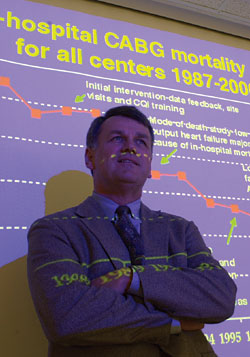Income-mortality link is revealed by study of CF registry
DMS researchers have nailed down an interesting fact about cystic fibrosis (CF): the CF death rate is related to income. In a study published in Pediatrics, the researchers showed that CF patients in families with a lower household income have an increased risk of death from the disease.
Median: The study looked at patients in the national CF registry who had been diagnosed with the disease before the age of 18 and linked them by zip code to median household income.

|
|
Gerry O'Connor, pictured above making
a presentation about the death rate
from coronary bypass surgery, used similar
methodology to more recently show
a link between family income and the
death rate from cystic fibrosis. |
After adjusting for cost of living, age at diagnosis, and other factors, they found that the lowest income category (below $20,000 a year) had a 44% higher rate of death than the highest income category (above $50,000 a year). They also determined that there was a steady increase in the risk of death as income dropped. "It wasn't that the mortality rates are low until you get poor and that's that," explains Gerald O'Connor, Ph.D., D.Sc., a professor of medicine and the lead author of the study.
O'Connor and his team also discovered that the CF patients' lung function and body weight started declining at about age six across all income categories— but that in the lower income categories, both lung function and body weight were consistently worse. In addition, the study revealed that treatment recommendations for CF patients did not vary by income category.
These findings prompted the Northern New England Cystic Fibrosis Consortium, of which DHMC is a member, to do a localized socioeconomic study. This will involve collecting detailed data about socioeconomic status, treatment adherence, education, and environmental conditions from CF patients in Maine, New Hampshire, and Vermont. Social workers from all the CF centers in the consortium are also conducting detailed interviews with patients. "This pilot study will eventually result in a national way of more directly collecting socioeconomic status [data]," says O'Connor.
By understanding more about socioeconomic status and CF patients, researchers can then lay the groundwork for better-informed care and treatment. Cystic fibrosis is a progressive genetic condition in which the body is unable to move salt and water in and out of cells properly. This creates a thick, sticky mucus in various passageways of the body, including the lungs and pancreas, causing difficulties in breathing and digestion. The mucus also serves as a breeding ground for bacteria.
About 30,000 children and young adults in the U.S. today have cystic fibrosis, and about 1,000 new cases of CF are diagnosed every year. While 30 to 40 years ago, most children with the disease died by the age of two, today many people with CF live beyond 30, thanks in part to better nutrition and better medications, such as Pulmozyme, which decreases the viscosity of the mucus in the lungs.
Time-consuming: Treating the disease is time-consuming, however. Patients need medicines with every meal and snack, antibiotics two or three times a day, and regular vitamin supplements. They also need to have their chests percussed—clapped hard—for 15 to 20 minutes several times a day to drain the mucus from their lungs.
"So you can imagine people who have less social support, who have less resources of all kinds, and it being very hard to be attentive completely to that kind of regimen," says O'Connor. "That's what we're doing with this [pilot] study—to try to find out about socioeconomic status, to try to find out about adherence."
Matthew C. Wiencke
If you would like to offer any feedback about this article, we would welcome getting your comments at DartMed@Dartmouth.edu.
